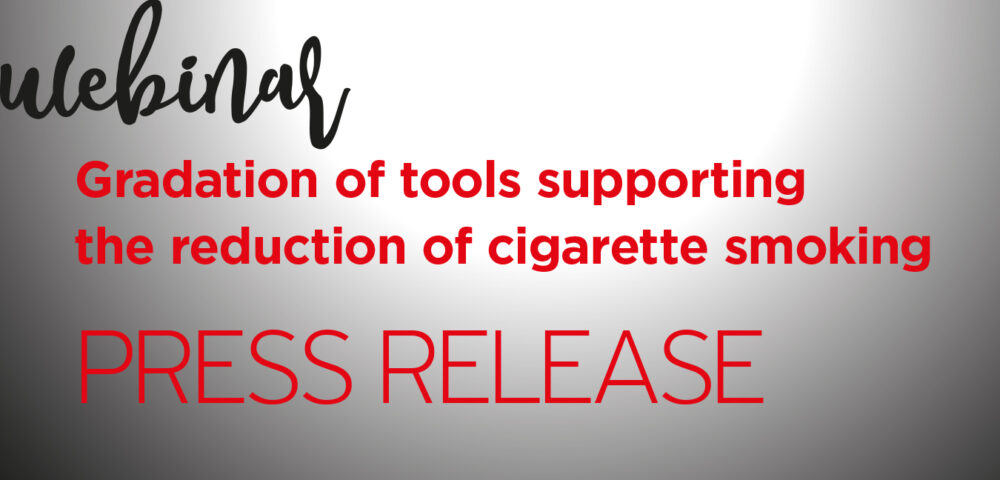
Press Release || “Gradation of tools supporting the reduction of cigarette smoking”
Press Release || Webinar “Gradation of tools supporting the reduction of cigarette smoking”
Wednesday, July 3rd, 2024, 15:00-16:30 CEST
“A multi-factorial approach is necessary to address the global challenge of smoking”
The rising number of deaths due to cigarette smoking and the need for effective strategies to address this global public health issue was emphasized in the introduction to the webinar by Professor Andrzej Fal. He emphasized the importance of healthcare spending in preventing deaths: “16% of deaths could be avoided through healthy living”, he underlined. As he stated, the commonly adopted ‘end game’ policy hasn’t brought the expected results; most countries applying it very strictly have kept their statistics at a level of twenty percent of the smoking population. More countries are now looking for other solutions, a combination of primary prevention with legislative and fiscal tools, early detection of cigarette-related diseases in early screening, harm reduction and prevention of severe complications. These countries are currently leaders in the effective fight against smoking addiction. Sweden has recently been recognized as a ‘smoke-free country’ (less than 5% of the population smokes). Professor Fal also emphasized the need to prioritize prevention over curative or interventional medicine and highlighted the disparity in spending on prevention amongst countries, with Poland leading in this area, but with overall spending still falling short. He highlighted the need for early screening and harm reduction techniques in secondary and tertiary prevention.
Dr. Piotr Karniej in his speech stressed the need for continuous research and update of knowledge. He highlighted the importance of education, psychological support, and inclusion of a range of healthcare specialists in the fight against smoking. He stressed the importance of an individualized approach in treatment and the role of health education in primary prevention. Early intervention and school programmes are very valuable, he underlined. In addition, he discussed the need for stronger legislation, family support, and public awareness campaigns that promote a healthy lifestyle and educate people about the effects of smoking. Andrzej Fal and Piotr Karniej elaborated on the contrasting attitudes towards harm reduction techniques, with Professor Fal emphasizing the two types of attitudes – the puritans and the pragmatics. Piotr Karniej stressed the importance of education, taxes, and dedication to people under 18 as essential solutions in addressing smoking-related issues.
The impact of price on consumer behaviour and public health was elaborated by Professor David Sweanor, who emphasized the crucial role of price in influencing consumer decisions and its impact on public health, focusing on the case of cigarette smoking. He shared insights about the success of cigarette taxes increase in Canada, which resulted in a significant reduction in smoking rates, particularly among young people. Professor Sweanor also argued on the use of cross-elasticity and pricing strategies to encourage consumers to switch to lower-risk tobacco products, citing examples from various countries and successful market shifts driven by price differentials. He criticized the moralistic perspectives of nicotine use and advocated for a focus on public health and consumer rights underscoring the potential for significant advancements in public health through the strategic use of product pricing. Within this context, David Sweanor argued on the need to make alternative products cheaper and more accessible, emphasizing the impact of taxes on consumer choices and highlighting the significance of providing alternatives and truthful information about relative risks to drive behaviour change.
Professor Edward Franek discussed the role of medical specialists in guiding patients through smoking cessation, highlighting the effectiveness of psychological and pharmacological treatments, as well as harm reduction approaches. He emphasized the importance of referring patients to psychologists for motivation and stated that he primarily relies on nicotine replacement therapy and heat-not-burn products.
Andrzej Fal, who moderated the discussion, also emphasized the need for more research on the safety and effectiveness of alternative smoking products.
The webinar was organised by SCOHRE, the International Association on Smoking Control & Harm Reduction, and the Polish Society of Public Health.
Issues raised during the webinar:
- Public Health Specialists should develop and implement educational programmes for smoking cessation, targeting both young people and adults.
- Public Health Agencies should also review financial incentives for smoking cessation to motivate individuals to quit smoking.
- Individual counseling, psychological treatments, and pharmacological therapies are all necessary to support smoking cessation efforts.
- Further research is necessary to evaluate the effectiveness of harm reduction techniques and alternative nicotine products for smoking cessation.
- Governments should review their tax policies to create a significant price differential between cigarettes and alternative nicotine products to encourage smoking cessation.
SPEAKERS:
Andrzej M. Fal, Prof. h.c., MD, PhD, MBA, FAAAAI, President, Polish Society of Public Health, Head Department of Allergy, Lung Diseases and Internal Medicine, Central Clinical Hospital, Ministry of Interior, Poland
Edward Franek, Professor, National Institute of Medicine of Ministry of Internal Affairs, Warsaw, Poland
Piotr Karniej, Public Health Specialist, HIV/AIDS Certified Counsellor, Bachelor of Nursing (BN)
David T. Sweanor J.D., Chair of the Advisory Board, Centre for Health Law, Policy & Ethics, University of Ottawa || Adjunct Professor, Faculty of Law, University of Ottawa || Global Leadership Council, Boston University School of Public Health || Legal Counsel, Non-Smokers’ Rights Association, 1983-2005
Το watch the video recording, please visit the webinar platform: WATCH

